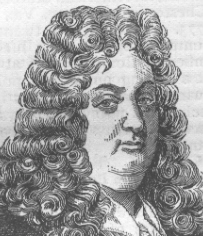Jean Racine
|
|
Jean Racine (December 22, 1639 – April 21, 1699) was a French dramatist, one of the "big three" of 17th century France (along with Molière and Corneille). Racine was primarily a tragedian, though he did write one comedy.
Born in La Ferte-Milan, Racine was orphaned in his youth and was given a classical education courtesy of his grandmother. He was a graduate of Port-Royal, a religious institution which would greatly influence other contemporary figures including Blaise Pascal. He was expected to study theology, but preferred to devote himself to the theatre, and moved to Paris. His first tragedy, La Thébaide (1664) and its successor, Alexandre (1665), both had classical themes, but he was already entering into controversy, taking offence at the accusation that he was polluting the minds of his audiences. He broke all ties with Port-Royal, and proceeded with Andromaque (1667), which told the story of Andromache, widow of Hector, and her fate following the Trojan War. He was by now acquiring many rivals, including Pierre Corneille and his brother, Thomas Corneille. Tragedians often competed with alternative versions of the same plot: for example, Leclerc produced an Iphigénie in the same year as Racine (1674), and Pradon's Phèdre (1677). The success of Pradon's work (the result of the activities of a claque (http://tinyurl.com/bbkyt)) was one of the events which caused Racine to renounce his work as a dramatist at that time.
However, the major incident which seems to have contributed to Racine's departure from public life was his implication in a court scandal of 1679. He got married at about this time, and his religious beliefs and devotion to the Jansenist sect were revived. When at last he returned to the theatre, it was at the request of Madame de Maintenon, mistress of King Louis XIV, with the moral fables, Esther (1689) and Athalie (1691), both of which were based on Old Testament stories and intended for performance by the pupils of the convent of Saint-Cyr.
Racine's work faced many criticisms from his contemporaries. One was the lack of historic veracity in plays such as Britannicus (1668) and Mithridate (1673), which, to those familiar with the plays of Shakespeare, might seem irrelevant. Racine was quick to point out that his greatest critics - his rival dramatists - were among the biggest offenders in this respect. Another major criticism levelled at him was the lack of incident in his tragedy, Bérénice (1670). Racine's response was that the greatest tragedy does not necessarily consist in bloodshed and death.
The quality of Racine's poetry is perhaps his greatest contribution to French literature. His use of the alexandrine is classic in its harmony, simplicity and elegance.
Jean Racine died in 1699 and is buried in the St. Etienne-du-Mont cemetery in Paris, France.
Works
- Ode sur la convalescene du roi, 1663
- La renommée aux muses, 1663
- La thebaïde, ou les frères ennemis, 1664 - The Thebans, or The Enemy Brothers
- Alexandre le grand, 1665 - Alexander the Great
- Andromaque, 1667 - Andromache
- Les plaideurs, 1668 - The Litigants
- Britannicus, 1669
- Bérénice, 1670 - Berenice (daughter of Agrippa I)
- Bajazet, 1672
- Mithridate, 1673 - Mithridates
- Iphigénie, 1674 - Iphigenia
- Phèdre, 1677 - Phaedra
- uvres, 1679
- Esther, 1689
- Athalie, 1691 - Athaliah
External Links
| Preceded by: François de La Mothe-Le-Vayer | Seat 13 Académie française | Succeeded by: Jean-Baptiste-Henri de Valincour |
de:Jean Racine eo:Jean RACINE fr:Jean Racine ko:장 라신 it:Jean Racine nl:Jean Racine pl:Jean Baptiste Racine sv:Jean Racine

